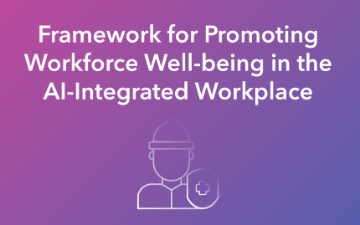
Ann Skeet is the senior director of Leadership Ethics at the Markkula Center for Applied Ethics at Santa Clara University. Views are her own.
The Partnership on AI just released a paper, “Framework for Promoting Workforce Well-being in the AI- Integrated Workplace," prepared by a group of professionals from different parts of the world and various enterprises, working together since the spring of 2018, to consider workforce well-being in an artificial intelligence (AI) integrated workplace. Collaboration is messy. Multi-stakeholder collaborations are especially messy, and multi-stakeholder collaborations convened by a start-up nonprofit have, perhaps, the greatest potential for messiness. Yet, the work has been gratifying, and when I reflect on why that is so, I believe it is because it was done with an openness and desire for doing the work at all.
The open stance of the people who worked on the framework, and the organization that sponsored it, PAI, is key. It may be part of what caught the attention of my colleague, Irina Raicu, who steered the Ethics Center to its involvement with PAI. It certainly caught mine. That such a framework emerged as a significant project in PAI’s early days speaks to a growing understanding that how we develop and use AI is not about intelligence created, but the human lives enhanced.
I can imagine a lot of places where a proposal to consider wellbeing would be dismissed. For much of my thirty years working in Silicon Valley, that has been my experience. But recently, there has been a critical shift from innovating to the limit of human ability to a more humanity-centric approach to making things. Human-centered design was popularized around the turn of the 21st century with the rise of personal computing and firms, like IDEO, focused on design. But humanity-centered design adds a key nuance, in that it preferences the common good along with the right we each have for dignity, the right to enjoy the respect of others simply because we are people.
The common good places value on those things that exist to serve us all together, not just as individuals. Seeing AI in the service of people, and that which they share, is crucial to how we reason through which AI we are not only able to create, but should create.
Many know of the tragedy of the commons, public assets that are neglected because no one person owns them, their value eroding over time as a result of that neglect. The framework offered here guides innovators to consider not only each of our individual rights, but also the ways we are connected, and the implications of which AI is brought to market, for those connections.

Approaching artificial intelligence in the context of well-being captures the essence of ethics as an understanding of human flourishing; a hopeful, positive frame for the work of ethics and one not always reached by people in pursuit of being ethical. This document offers a starting point for enterprise leaders focused on the interaction between people and AI. We encourage, within our recommendations, care not only to the development and use of, but it’s integration with existing organizational systems and functions.
No doubt this framework, and the accompanying recommendations, questions, and tools will be improved upon significantly as more people think about the work and join the dialogue. But its existence invites us to measure the value of AI not on what is possible, but what supports our dignity and human connections with one another. It reminds us that we retain autonomy over our identity, and can evaluate AI’s efficacy and purpose always in the context of doing good things for humanity—all of humanity as a collective, not one person or group of people within it who determine how to use AI to serve personal interests.
Since our work on this Framework for Workforce Well-being began, a global pandemic has arrived. Against the backdrop of this historical moment, executives are expressing profound optimism about the future of their businesses, in part because the urgent need for so many office employees to do their work remotely has accelerated digital transformation beyond their most optimistic business forecasts. This optimism matters. It shows the potential for effective, rapid change tied to new creations, like AI, when that change is grounded in something that is in the service of humanity and the common good.
